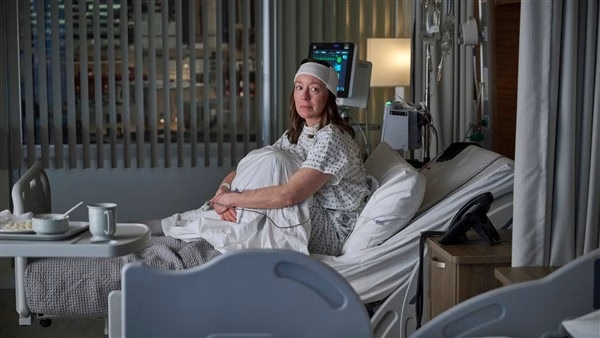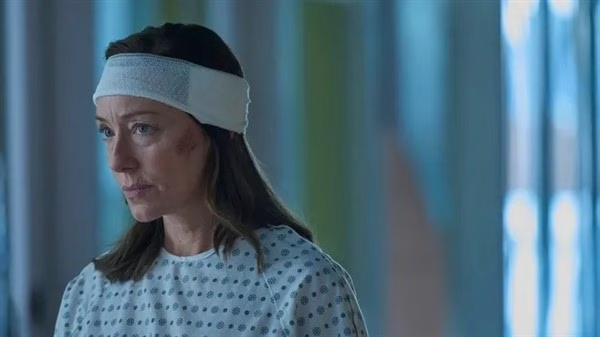Doc “If at First You Don’t Succeed…”
Developed and written by Barbie Kligman (based on Doc – Nelle tue mani by Francesco Arlanch and Viola Rispoli)
Directed by Rebecca Thomas
Airs Tuesdays at 9pm EST on FOX
In the almost-twenty years since the debut of Grey’s Anatomy, network television has once again become utterly littered with forgettable first responder dramas; in 2025, 2/3 of NBC’s airtime is dedicated to the ‘Chicago-verse’, while ABC, CBS and FOX have all taken multiple swings at the ever-popular “Doctors with Disorders” and “Suits & Scrubs” genres over the years – in what’s become an increasingly homogenous mixture of white coats, procedural acronyms, and implied sex-having. Most of these shows follow a simple formula, where one-off medical anomalies coincide with thoroughly forgettable plots where characters spend half their time rehashing conversations from other scenes (it’s a neat trick, one that fills time but unfortunately turns all your dialogue into indistinguishable mush).
Doc, FOX’s latest attempt at the Doctors with Disorders drama, ticks all of these aforementioned, unfortunate boxes; though there are brief glimmers of a better show lying underneath its predictable narrative, uninspired visuals, and lifeless audio production, they are utterly buried by the show’s rather sterile attempts to bridge its world of egos and hearts with an audience – one already inundated with similar (if not better) choices to make within the genre (though I suppose maybe some The Good Doctor fans out there are still looking for a home).

Adapted from a popular Italian medical drama (inspired by its own true story) by Barbie Kligman, Doc‘s first episode “If at First You Don’t Succeed…” is a feckless regurgitation of medical cliches, the kind of pilot script one could easily build a genre-spanning Bingo sheet to (and without much effort). It follows The Worst Day Ever for Dr. Amy Larsen (Molly Parker, doing her best with the material), who spends a day being bitchy to her patients before getting into a car accident that gives her retrograde amnesia, causing her to forget the last eight years of her life.
Though gimmicky, one can immediately see a bit of potential in its premise; could you imagine not remembering anything that happened after the 2016 election cycle, including COVID? Instead of engage with that idea, Doc immediately begins to shift into stereotypical medical drama mode. There’s the bitchy doctor who gets results, the arrogant white overachiever, the upstart Black intern who doesn’t see eye to eye with his peers, suits who care about numbers, a Hot Doctor Parker’s Dr. Amy Larsen is hooking up with… but once the brief, lifeless title card drops, Doc uses its predecessors as if reading ancient sheet music, limply recreating familiar tropes and ideas around a set of two-dimensional characters, introduced with import, even though narrative nor performance has nothing to say about what makes them interesting and compelling in their own right.

What makes it feel particularly half-assed in Doc is how its many disparate parts are assembled (and I’m just talking narratively; forget about the show’s in media res opening and random flashback sequences); there’s little attempt to make anything interesting of them, or even examine how they interact. The show is about a woman who forgets the last eight years of her life – and yet, she’s only given space to be concerned about the things occurring in the ten minutes before her accident, which limits the show’s ability to build pathos into any of its characters, be it the reflective ex-husband (Omar Metwally), her young, strong-jawed doctor lover (Jon-Michael Ecker), or even the show’s antagonist, a reckless doctor who takes advantage of Amy’s brain injury to further this own ambitions (Scott Wolf, unfortunately not reprising his role on BoJack Horseman). It’s importance is all assumed; at no point does the pilot stop telling and start showing, which makes for a pretty ineffective episode about doctors and how they work (or people and how they interact).
I will say one thing about this series; deeeep underneath the medical mumbo jumbo, the interoffice political bullshit, and all the other nonsense Doc throws against the wall like so much spaghetti, is a series with a lot of potential. Though Dr. Larsen is a deeply unlikable character, there’s an undeniably compelling story about someone looking back and recognizing nothing about their life and how it turned out, trying to reconcile their sense of self and find peace. Squint your eyes hard enough, and one can almost see the nascent strings of shows like Rectify or Barry, of someone coming to terms with the world and how it perceives them – unfortunately, Doc spends so much of its time as a predictable medical drama, its ability to even introduce these ideas through the first episode are few and far in between.

Instead, our time is spent politicking around the hospital, following self-serving administrators, lovestruck people in scrubs looking longingly off camera, and barely lit office scenes where people argue about board positions, dick-measuring, and other weightless dramas needlessly tethered to a series ostensibly about a woman, her colleagues, and the people they’re trying to help. In a television landscape already competing for a limited amount of time and eyeballs, “If at First You Don’t Succeed” feels so passionless and forgettable, immediately putting the series at a disadvantage in trying to get audiences to engage beyond the first episode – or, given its incredibly generic title, even be able to remember what the show’s title is.
Doc will not be the worst pilot of 2025, that’s almost for certain; however, its relentless mediocrity makes it an incredibly tough show to engage with consistently for 42 minutes (which, in its own way, is the show’s biggest crime) – especially in the blindingly obvious moments it refuses to engage with itself, and leans on a chain of tropes and cliches to feign at importance. It’s almost as if Doc assumes its audience has forgotten the past eight, ridiculously repetitive years of network medical dramas alongside everything its protagonist has – that’s not the case, unfortunately, which just makes Doc feel like an incredibly sterilized, inflexible copycat of the many series it tries to imitatate.
Grade: D
Discover more from Processed Media
Subscribe to get the latest posts sent to your email.


